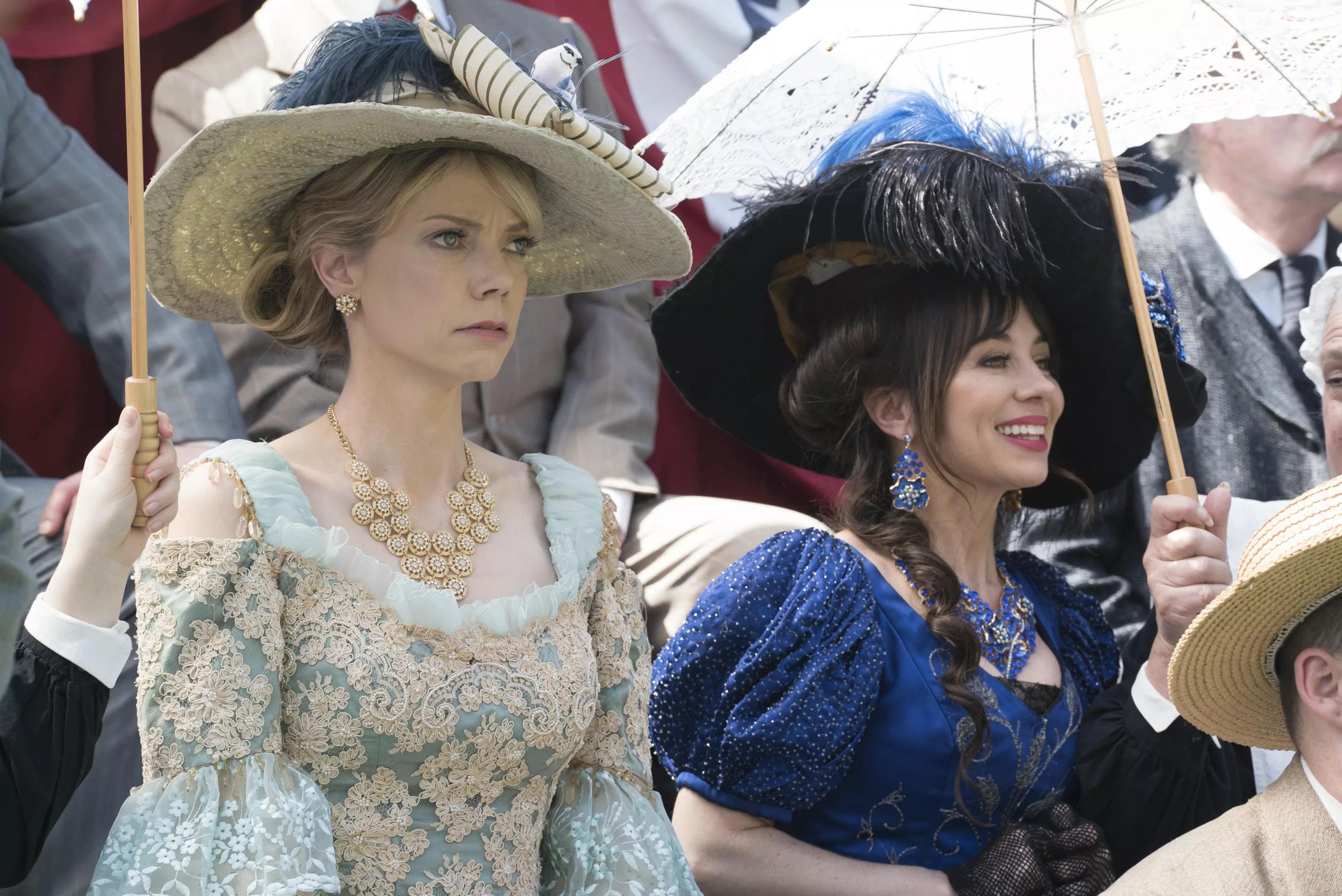
Ali Goldstein/Courtesy of Comedy Central

Audio By Carbonatix
Drunk History and Another Period air on Comedy Central
It’s almost amazing how Drunk History, now in its fourth season, has yet to run out of steam with its simple premise – getting funny people shitfaced and having them give their spotty, occasionally slurred, most often profane takes on great moments and people in history, while performers act out the tales verbatim in dramatized sequences. Series creator/host/repertory player Derek Waters is always close by, getting tipsy in solidarity. He’s been doing it for most of the decade, starting with filming shorts for his own weekend show at the Upright Citizens Brigade, then later getting them shown on the Funny Or Die website, and finally turning the whole thing into a full-fledged hit on Comedy Central.
While it’s fun watching Waters and his multicultural cast re-create the ramblings, the real comedy comes from seeing just how intoxicated these orators get while telling their stories. Drunk people trying to explain stuff are never not funny. Whether it’s Edgar Allen Poe’s feud with Rufus Griswold or what happened during that meeting between Elvis and Nixon, both stories told on the show, watching these speakers get pissed to the point of retching or falling face-first on the floor simply doesn’t get old. Sometimes it gets emotional – comedian Jen Kirkman, who’s been a recurring storyteller since the Funny Or Die videos, ended one segment about rebellious Quaker Mary Dyer (played in the segment by Winona Ryder) in tears. Last season, the creators even got Lin-Manuel Miranda to hazily explain the history of Alexander Hamilton and Aaron Burr, played by Alia Shawkat and Aubrey Plaza. That brought History full circle, since the first Funny Or Die video was an account of the Hamilton-Burr rivalry.
So far this season, Waters has landed Tiffany Haddish, who did a wickedly ratchet retelling of the story of World War II art savior Rose Valland (played by Busy Philipps), and admitted History stan Ahmir “Questlove” Thompson, who talked about the origins of hip-hop while sipping on Champagne.
This year, make your gift count –
Invest in local news that matters.
Our work is funded by readers like you who make voluntary gifts because they value our work and want to see it continue. Make a contribution today to help us reach our $30,000 goal!
What’s most impressive about History is how Waters sneakily tries to hip viewers of moments and figures they really should know about. I know I’m not the only one who thinks History is essentially an irreverent, uninhibited version of Schoolhouse Rock! (The History section of the Comedy Central website features illustrations reminiscent of Schoolhouse.) But, hey, whatever it takes to school people to the groundbreakers and trailblazers who made this country what it is today, keep doing it. The show manages to make learning awesome by having toasted associates serve as armchair professors. Even when these people slur their way through their impromptu lectures, embellishing some facts and sprinkling the dialogue with four-letter words, their enthusiasm for their subjects – they speak of these figures like they’re badass rock stars – proves truly exciting, even infectious. They’re in to it. Maybe we all would’ve learned more in high-school history if the teachers told it while guzzling from bottles of Jack.
Another Period is another Comedy Central show that crudely teaches audiences about the past. (It airs right after History on Tuesday nights.) Now in its third season, it’s created by and starring ironically self-centered comic Natasha Leggero and Riki Lindhome, one-half of the eternally adorable, singing-comedy duo Garfunkel and Oates. (Am I the only one who misses that IFC show they did, also called Garfunkel and Oates?) Leggero and Lindhome are Lillian and Beatrice, two consistently vapid siblings looking to make themselves famous in early 20th-century America. Needless to say, Period is a satirical mashup of Downton Abbey and Keeping Up with the Kardashians, with Leggero and Lindhome’s vain, sociopathic attention-cravers often giving talking-head interviews about their attempts to shine brightly.
Even without the unintentionally awkward reality-TV conceit, Period does reveal how crazy times were back then. Much like History, the rude and raunchy Period slides some facts in among the crass laughs. (Both shows share a director: Jeremy Konner, the little brother of Girls writer-producer Jenni Konner.) The show is set in Newport, Rhode Island, in the early-1900s, on the tail end of The Gilded Age, when robber barons and their families made homes and did crazy shit with their money just because they could. So, the ridiculous, vulgar, unbelievably insane things the sisters and their family do (usually to their poor servants – in one, recent episode, a maid is unfortunately called on to fiddle Beatrice’s lady parts until she reached climax) are disturbingly not far off the mark.
Also just like History, Period offers a chance for comedians and the actors who love them to play dress-up and goof off in a period-piece setting. (The cast is littered with alumni from UCB, Saturday Night Live and The State.) Period sometimes goes overboard with its obnoxious, outrageously grotesque humor, but because it’s anchored by two (very funny) women, it reminds viewers how little say women had in anything back then – and how they fought hard to change that. As self-serving and vapid as Leggero and Lindhome’s sisters can get, like so many women living in a heavily patriarchal society, they ultimately just want to matter. (When these attention-seekers occasionally do stumble into notoriety, they’re seen – accidentally – as feminist icons.)
In its own farcical, extravagantly exaggerated way, Another Period shows how women have always had to fight for respect, for equality, for a seat at the table. For all its lewd, ludicrous antics, this is just the show we need in this #MeToo/Time’s Up era.